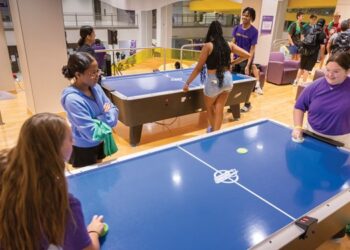The expert advice to answer your most pressing questions. This month, Cameron Adams, the coordinator of facility operations at Washington State University Recreation, shares advice on facilities.
What does your background experience look like?
CA: I have worked full time in facilities for about four years. Including undergraduate and graduate school, I have been working in facilities for about eight years. Most of my experience is in campus recreation, but I also have some facility experience in minor league baseball, college athletics and several various special events.
Why is facility maintenance a constant thing?
CA: As long as patrons are coming into the facility, there will be things that get broken from overuse, misuse, or just general wear and tear. By staying on top of these things and doing preventative maintenance, it can help to keep equipment running well and for a longer period of time. Our goal is to have equipment fixed and back onto the floor in as short of time as possible.
What are your top tips for facility maintenance?
CA: One goal we have at our facility is to keep it looking under five years old, and regularly on tours people will make comments about how new the facility looks while we are in our 18th year of operation. The key to this is shutting the entire facility down for two separate weeks per year and cleaning every square foot of the facility. During this time we also update equipment and do any of the major repairs that need to be done, such as pool cleaning or court resurfacing. This allows us to stay ahead on all the things we can’t get to on a regular basis when we are open. I would highly suggest this type of shut down.
What have been the three biggest lessons learned?
CA: Communication is key and everyone communicates differently in how they want something done. I work with several departments that do special events or programming in our facility, and it took me a little time to learn how to adapt to their communication style. This leads me to my second lesson learned. Be proactive, not reactive. I am logistical in my planning process, so I have learned how to ensure all details are accounted for before they are even asked for. I also have learned to plan for multiple outcomes so if something does go wrong I have contingencies in place to handle whatever comes our way. Failure is fine, but only if you can learn from it. I have learned over time that learning from mistakes or failures can have a positive outcome if I am able to take what didn’t work well and turn that into a success the next time.
What is one thing you would tell other facility coordinators?
CA: Over the past several years I have worked with dozens of people both in our department and other departments on campus, and when I need help doing something or need a favor, I know the relationships I have built will help me get things done. You never know when you may need someone to give you a hand, but by having good relationships I know in times of need there will be people who have my back, and I will have theirs anytime they ask.










